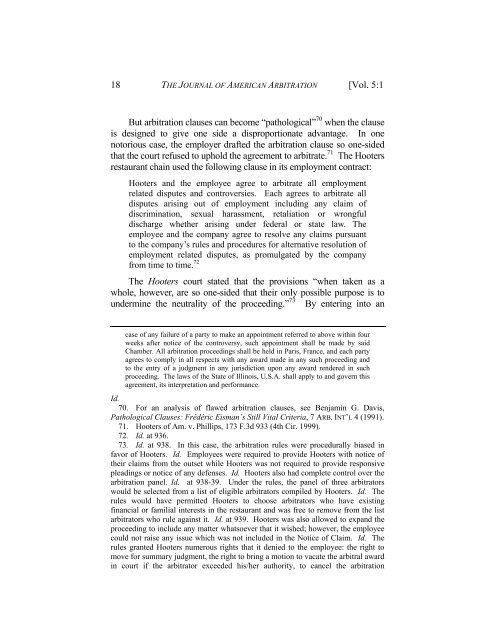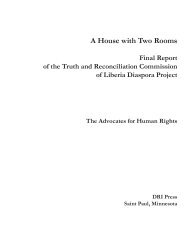2006/Vol. 5 No.1 - Hamline Law - Hamline University
2006/Vol. 5 No.1 - Hamline Law - Hamline University
2006/Vol. 5 No.1 - Hamline Law - Hamline University
Create successful ePaper yourself
Turn your PDF publications into a flip-book with our unique Google optimized e-Paper software.
18 THE JOURNAL OF AMERICAN ARBITRATION [<strong>Vol</strong>. 5:1<br />
But arbitration clauses can become “pathological” 70 when the clause<br />
is designed to give one side a disproportionate advantage. In one<br />
notorious case, the employer drafted the arbitration clause so one-sided<br />
that the court refused to uphold the agreement to arbitrate. 71 The Hooters<br />
restaurant chain used the following clause in its employment contract:<br />
Hooters and the employee agree to arbitrate all employment<br />
related disputes and controversies. Each agrees to arbitrate all<br />
disputes arising out of employment including any claim of<br />
discrimination, sexual harassment, retaliation or wrongful<br />
discharge whether arising under federal or state law. The<br />
employee and the company agree to resolve any claims pursuant<br />
to the company’s rules and procedures for alternative resolution of<br />
employment related disputes, as promulgated by the company<br />
from time to time. 72<br />
The Hooters court stated that the provisions “when taken as a<br />
whole, however, are so one-sided that their only possible purpose is to<br />
undermine the neutrality of the proceeding.” 73 By entering into an<br />
case of any failure of a party to make an appointment referred to above within four<br />
weeks after notice of the controversy, such appointment shall be made by said<br />
Chamber. All arbitration proceedings shall be held in Paris, France, and each party<br />
agrees to comply in all respects with any award made in any such proceeding and<br />
to the entry of a judgment in any jurisdiction upon any award rendered in such<br />
proceeding. The laws of the State of Illinois, U.S.A. shall apply to and govern this<br />
agreement, its interpretation and performance.<br />
Id.<br />
70. For an analysis of flawed arbitration clauses, see Benjamin G. Davis,<br />
Pathological Clauses: Frédéric Eisman’s Still Vital Criteria, 7 ARB. INT’L 4 (1991).<br />
71. Hooters of Am. v. Phillips, 173 F.3d 933 (4th Cir. 1999).<br />
72. Id. at 936.<br />
73. Id. at 938. In this case, the arbitration rules were procedurally biased in<br />
favor of Hooters. Id. Employees were required to provide Hooters with notice of<br />
their claims from the outset while Hooters was not required to provide responsive<br />
pleadings or notice of any defenses. Id. Hooters also had complete control over the<br />
arbitration panel. Id. at 938-39. Under the rules, the panel of three arbitrators<br />
would be selected from a list of eligible arbitrators compiled by Hooters. Id. The<br />
rules would have permitted Hooters to choose arbitrators who have existing<br />
financial or familial interests in the restaurant and was free to remove from the list<br />
arbitrators who rule against it. Id. at 939. Hooters was also allowed to expand the<br />
proceeding to include any matter whatsoever that it wished; however, the employee<br />
could not raise any issue which was not included in the Notice of Claim. Id. The<br />
rules granted Hooters numerous rights that it denied to the employee: the right to<br />
move for summary judgment, the right to bring a motion to vacate the arbitral award<br />
in court if the arbitrator exceeded his/her authority, to cancel the arbitration
















